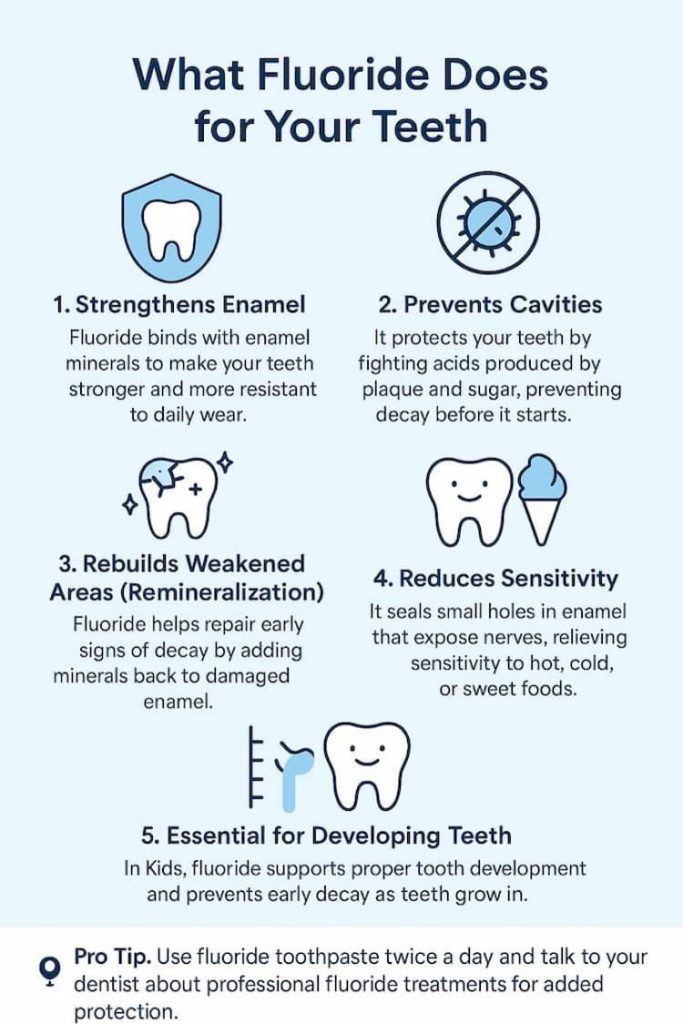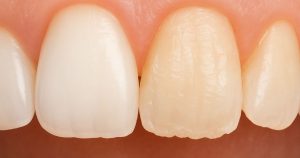Fluoride treatments are one of the simplest and most effective ways to protect your teeth from tooth decay. Whether you’re sitting in a dental chair or using prescription-strength fluoride at home, the goal is the same: stronger, healthier teeth.
While you may already get fluoride from toothpaste or tap water, professional treatments at the dentist offer a stronger, longer-lasting boost. But how do they work, and are there any risks?
In this article, we’ll walk you through the real benefits of fluoride treatment, who needs it, how often to get it, and what to watch out for.
What Is Fluoride Treatment?
Fluoride treatment is a quick dental procedure where a concentrated fluoride solution, usually in the form of a varnish, gel, or foam, is applied directly to your teeth. It’s designed to remineralize weakened enamel and make teeth more resistant to acid attacks caused by plaque, bacteria, and sugary foods.

According to Medical News Today, fluoride plays a key role in preventing tooth decay by remineralizing enamel and making teeth more resistant to acid damage.
Key Benefits of Fluoride Treatment
So, what does fluoride do for your teeth? Let’s break it down.

Protection Against Cavities
The number one reason dentists recommend fluoride is cavity prevention. It helps stop tooth decay in its earliest stages and makes enamel more resistant to daily acid wear from foods and drinks.
If you’ve been getting small cavities despite your oral hygiene routine, fluoride treatment can often reverse early-stage decay before it turns into a bigger (and more expensive) problem.
Strengthening Tooth Enamel
Enamel is the tough outer shell of your teeth, but it isn’t indestructible. Fluoride replenishes minerals in enamel, strengthening it and prolonging your tooth’s life.
This is especially helpful if you:
- Drink a lot of acidic beverages (coffee, soda, wine)
- Grind your teeth
- Have visible enamel wear
Reducing Tooth Sensitivity
Fluoride doesn’t just prevent problems, it can also bring relief. It works by sealing microscopic pores in your enamel that cause sensitivity to hot, cold, or sweet foods.
If you’re avoiding ice cream or hot drinks because of that familiar “zing,” fluoride might just be your smile’s best friend.
Your Smile Deserves Protection. Let’s Talk!
Ready to give your teeth some love? Book your fluoride treatment with us today and step out with a stronger, healthier smile.
📞 Book a consultation today and let’s brighten your smile!
Possible Side Effects of Fluoride Treatment
Fluoride is generally safe, but like anything, it can cause side effects if overused or misused, especially in children.
Dental Fluorosis
This condition occurs when children consume excessive fluoride while their adult teeth are still developing (typically before the age of 8). It appears as white lines or streaks on the teeth.
But most cases are mild and cosmetic. And professional fluoride treatments, when used correctly, pose very little risk.
Overexposure Risks
In very rare cases, high levels of fluoride over time can cause toxicity. This is usually a concern when swallowing too much fluoride toothpaste or taking fluoride supplements incorrectly, not from a few professional treatments a year.
Safety Tip: Always supervise young children during brushing and use only a rice-sized amount of toothpaste for toddlers.
Learn more about fluoride treatments for kids at Pape Dental’s Children’s Dentistry.

Who Should Consider Fluoride Treatment?
Fluoride isn’t just for kids. Many adults benefit from regular treatments, especially if they fall into any of the following groups:
People who:
- Get cavities often
- Have braces, bridges, or crowns
- Suffer from dry mouth (xerostomia)
- Have receding gums or exposed tooth roots
- Consume a high-sugar or acidic diet
- Struggle with enamel erosion
If you’re not sure, just ask your dentist. A quick checkup can determine whether your teeth could use the extra support.
How Often Should You Get Fluoride Treatments?
How often you need fluoride treatments depends on your oral health and risk level.
| Risk Level | Recommended Frequency |
|---|---|
| Low | Once a year |
| Moderate | Every 6 months |
| High | Every 3–4 months |
Dentists typically recommend that children and teens get fluoride treatments every 6 months, while adults with enamel erosion or frequent cavities may need them more often. Consider setting reminders in your calendar after each cleaning to stay consistent with treatments.
Conclusion
Fluoride treatment is an easy, effective way to protect your teeth from decay, reduce sensitivity, and extend the life of your smile. While it’s not necessary for everyone, it’s a smart preventive option for kids, teens, and adults with higher cavity risk or enamel wear.
Talk to your dental hygienist about whether fluoride treatment makes sense for you, and enjoy the confidence that comes with healthier teeth.
FAQs
-
What does fluoride treatment do?
It helps rebuild tooth enamel, prevent cavities, and reduce sensitivity by making your teeth more resistant to acid damage.
-
Is fluoride treatment at the dentist’s worth it?
Especially for kids and adults prone to cavities or enamel erosion. It’s quick, painless, and cost-effective.
-
What is the downside of fluoride treatment?
Rarely, too much fluoride can cause dental fluorosis in kids or lead to toxicity if misused, but professional treatments are very safe when administered correctly.
-
How long does a fluoride treatment last?
Most treatments protect your teeth for 3 to 6 months, depending on your diet, oral habits, and risk factors.
-
Can adults get fluoride treatments, too?
Yes, adults benefit just as much as kids, especially if they have gum recession, dry mouth, or sensitivity. It’s a great way to keep your teeth stronger and healthier as you age.
-
Are there any side effects?
Side effects are rare. In kids, too much fluoride over time can cause fluorosis (white spots on teeth). Allergic reactions are extremely uncommon, and your dentist uses safe, controlled amounts.
-
Is fluoride treatment safe during pregnancy?
Yes, it’s completely safe during pregnancy. Protecting your enamel during this time is important because hormone changes can increase your risk of gum disease and cavities.
-
Does fluoride treatment hurt?
Not at all! It’s a quick, painless process. The fluoride is usually applied as a gel, foam, or varnish, and it only takes a few minutes during your regular dental visit.
-
Can fluoride whiten my teeth?
Fluoride doesn’t whiten like bleaching products, but it helps the enamel become smoother and healthier-looking. Strong enamel can reflect light better, making your smile appear brighter.






